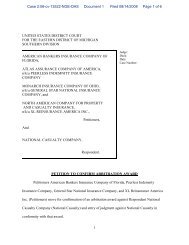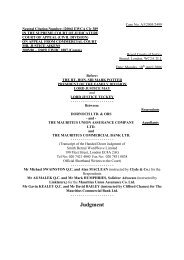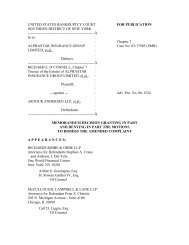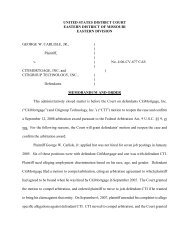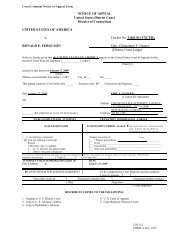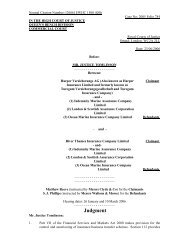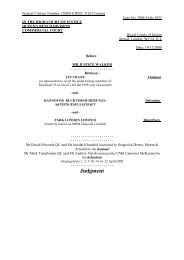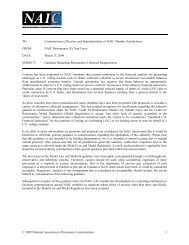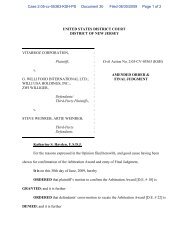Statutory Issue Paper No62R - Reinsurance Focus
Statutory Issue Paper No62R - Reinsurance Focus
Statutory Issue Paper No62R - Reinsurance Focus
Create successful ePaper yourself
Turn your PDF publications into a flip-book with our unique Google optimized e-Paper software.
Property and Casualty <strong>Reinsurance</strong><br />
SSAP No. 62R<br />
14. Q: In evaluating the significance of a reasonably possible loss, should the reasonably<br />
possible loss be compared to gross or net premiums?<br />
A: Gross premiums should be used.<br />
15. Q: How does a commutation clause affect the period of time over which cash flows are<br />
evaluated for reasonable possibility of significant loss to the reinsurer?<br />
A: All cash flows are to be assessed under reasonably possible outcomes. Therefore, unless<br />
commutation is expected in the scenario being evaluated, it should not be assumed in the<br />
calculation. Further, the assumptions used in a scenario must be internally consistent and<br />
economically rational in order for that scenario’s outcome to be considered reasonably<br />
possible.<br />
16. Q: What interest rate should be used in each evaluated scenario to make the present value<br />
calculation?<br />
A: A reasonable and appropriate rate is required, which generally would reflect the<br />
expected timing of payments to the reinsurer and the duration over which those cash<br />
flows are expected to be invested by the reinsurer.<br />
17. Q: SSAP No. 62 refers to payment schedules and accumulating retentions from multiple<br />
years as features that delay timely reimbursement of claims. Does the presence of those<br />
features generally prevent a contract from meeting the conditions for reinsurance<br />
accounting?<br />
A: Yes. Payment schedules and accumulating retentions from multiple years are contractual<br />
features inherently designed to delay the timing of reimbursement to the ceding entity.<br />
Regardless of what a particular feature might be called, any feature that can delay timely<br />
reimbursement violates the conditions for reinsurance accounting. Transfer of insurance<br />
risk requires that the reinsurer’s payments to the ceding entity depend on and directly<br />
vary with the amount and timing of claims settled under the reinsured contracts.<br />
Contractual features that can delay timely reimbursement prevent this condition from<br />
being met. Therefore, any feature that may affect the timing of the reinsurer’s<br />
reimbursement to the ceding entity should be closely scrutinized.<br />
18. Q: What if a contract contains a feature such as a payment schedule or accumulating<br />
retention but could still result in the reasonable possibility of significant loss to the<br />
reinsurer?<br />
A: Both of the following conditions are required for reinsurance accounting:<br />
a. Transfer of significant risk arising from uncertainties about both (i) the ultimate<br />
amount of net cash flows from premiums, commission, claims, and claim<br />
settlement expenses paid under a contract (underwriting risk) and (ii) the timing<br />
of the receipt and payment of those cash flows (timing risk); and<br />
b. Reasonable possibility of significant loss to the reinsurer.<br />
© 2009 National Association of Insurance Commissioners 62-27


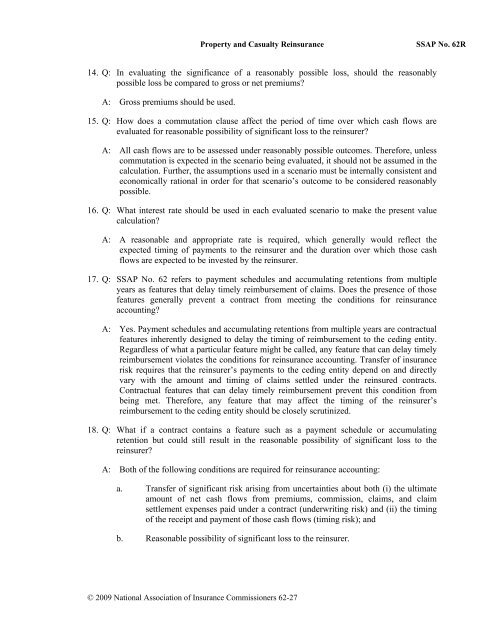
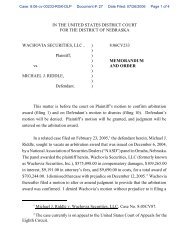
![202 Folio No 734 Neutral Citation Number: [2006] EWHC 1345 (QB ...](https://img.yumpu.com/50015000/1/184x260/202-folio-no-734-neutral-citation-number-2006-ewhc-1345-qb-.jpg?quality=85)
